Sunday, 20 December 2015
Friday, 11 December 2015
Wednesday, 9 December 2015
Tuesday, 8 December 2015
Sunday, 29 November 2015
Wednesday, 18 November 2015
JOOTRH CCC IN CHARGE Failed health system in #Kisumu ,County ,#KENYA that is in denial #WEWON'TBECOWED
Is it wrong to empower clients about their rights ? if yes that is the position of the person in charge of the patient support centre at the Jaramogi Oginga Odinga Teaching and Referral Hospital that serves the largest number of people living with #HIV in western #KENYA a region that is devastated by the AIDS pandemic .Whether you call me names I will continue to speak my mind .You are part of a a failed health system that is in denial
Friday, 13 November 2015
#RIP #RUTHKAMBA THE LADY WHO WEARS TWO RIBBIONS-#RED AND #PINK
Support the NEPHAK National Treasurer, the Late Ruth Kamba meet her hospital bills and funeral arrangements. You can support using mobile payment platforms MPESA and EQUITEL Paybill No. 891300 Account No. 5333; AIRTEL MONEY Business Name. MCHANGA, Reference 5333.
and online payment solutions PAYPAL and SIMBAPAY by following
Thursday, 12 November 2015
Wednesday, 11 November 2015
#WORLDAIDSDAY2015 #TB IS KILLING MORE PEOPLE THAN AIDS GO FOR #TB #SCREENING
I Erick Okioma happy that everyone is talking about #TB screening as one of the activities for World AIDS Day 2015 the beauty is using all available tools from what a community health volunteer can do to what lab technologist does .Thank you The Global Fund to Fight AIDS, Tuberculosis and Malaria. TB Alert Nmandela Tb-hivrcStop TB Partnership- KenyaPamoja TB GROUP Drug Resistant TB Unit, Lady Reading Hospital, Peshawar, PakistanNephak Kenya RESULTS ACTION ACT UPTreatment Action Group (TAG)International AIDS Candlelight MemorialInternational Community of Women Living with HIVAll In - End Adolescent AIDS International Treatment Preparedness CoalitionUNAIDSNACC_Kenya Global Coalition of Tuberculosis Activists


Friday, 30 October 2015
60 Kenyans die daily of #TB and 200 get infected daily with #TB because of a failed health system which is in denial
@KELINKenya @NJotwoma @KTNKenya @CDCgov @RESULTS_Tweets @USAID @USAID .@M_Raviglione @WHO @MalecheAllan @CHSKenya @StopTB @NTLD @MinHeathKE @TAGTeam_Tweets Success in eradicating #TB should not only be measured with data in terms cure rate but also commensurate with how many reached with information,How many and how of the affected communities are meaningfully involved or reached out with information which is key to prevention of #TB and a cheaper strategy .In #TB programming this is the least funded area in resource allocation at the tip of a cone upside down and this is where the community is and #TB is in the community and programmers at the cone base which is wider and thicker with more experts being created to deplete the scarce resources
Thursday, 29 October 2015
Wednesday, 28 October 2015
At African Union–India meeting in Delhi, African leaders and India should work together to protect access to affordable medicines by Shailly Gupta MSF Access Campaign New Delhi
New Delhi, 26 October 2015—As African leaders meet with Indian Prime Minister Narendra Modi in New Delhi for an African Union-India meeting this week, Médecins Sans Frontières/Doctors Without Borders (MSF) urged African governments and India to work together to maintain trade in affordable generic medicines that is a lifeline for millions of people in India, Africa and other developing countries.
India is under considerable bilateral pressure from the United States and other developed countries to roll back its pro-public-health intellectual property policies that has put access to vital lifesaving generic drugs above the profits of multinational pharmaceutical companies. India is known as the ‘pharmacy of the developing world,’ with more than 80% of HIV medicines used in developing countries, for example, being generics from India.
“In 2005 when India needed to amend its patent laws, the government made the conscious decision to protect people over profits and implemented some key pro-public health provisions”, said Leena Menghaney, Head-South Asia, MSF Access Campaign. “India’s policies have allowed for the production of affordable generic medicines which many millions of people across the developing world, including Africa, rely on.”
The historical lack of patent barriers in India opened up generic production of some older antiretroviral drugs, allowing the price of HIV drugs to be driven down from over US$10,000 per person per year in 2000; today the recommended first-line treatment costs governments in Africa and India just over $100 per patient per year, and 15 million people in the developing world now receive HIV treatment.
MSF uses generic medicines made in India to treat more than 200,000 people living with HIV in its programmes, and relies on Indian generics to treat many other diseases and conditions, such as drug-resistant tuberculosis.
“The Indian Prime Minister must consider the need to combat growing epidemics such as drug-resistant tuberculosis, where treatment for just one patient can cost several thousand dollars”, said Menghaney. “The cost of newer drugs to treat multi drug resistant tuberculosis (MDR-TB) could be cut by up to 95% if generic versions could be produced in India the same way as HIV drugs. India needs to continue its production and supply of lower-cost generics, which are essential for public health.”
“We were able to scale up HIV treatment in our programmes because Indian generic medicines made treatment more affordable,” said Dr. Gilles Van Cutsem, Medical Coordinator for MSF in South Africa. “We shudder at the threats that the India faces from the US government, other developed countries, and multinational drug companies. Any shift in India’s policy would dramatically undermine access to affordable medicines that we need in India, across Africa and beyond.”
MSF is urging African leaders and India to work together to combat efforts to undermine the ‘pharmacy of the developing world’.
“African leaders really should see this summit as an opportunity to work together with Prime Minister Modi to protect affordable access for people across the developing world”, said Dr Van Cutsem. “They need to remember that millions of people in Africa are alive today because of affordable medicines made in India.”
————————————
Shailly Gupta
MSF Access Campaign
New Delhi
__._,_.___
Posted by: Shailly Gupta
Tuesday, 27 October 2015
Tuesday, 20 October 2015
BACKGROUND ON IMMUNISATION IN KENYA
The Ministry of Health and partners like Global Alliance for Vaccines & Immunization (GAVI) and UNICEF has over many years continued to save the lives of children from life threatening diseases like TB, whooping cough, diphtheria, measles, pneumonia, meningitis, tetanus and polio.
In 2012, the progress was remarkable! 82% of all Kenyan children under 2 years attained the required immunizations. The government pursued all efforts to ensure the reduction of infant and child diseases and deaths. Kenya was in line with international policies aimed at drastically reducing child mortality by 2015.
However, latest administrative data reveal an alarming drop in Immunization Coverage in Kenya. By June 2014, the coverage had dropped from 82% to 68%. This means that a whopping 420,000 Kenyan children are currently not protected from vaccine preventable illnesses. In other words, 1 out of 4 children is not fully vaccinated against dangerous diseases such as neo-natal tetanus, measles and pneumonia. According to a UNICEF report, a new-born in Kenya and Burundi has the lowest chance in East Africa of surviving to celebrate their 5th birthday.
Imagine the emotional trauma families have to go through after witnessing death of a child from an illness that could have been prevented by vaccines at zero financial cost! The country is risking its economy base, i.e. a healthy human capital.
Similarly, news on TV, newspapers and radio has poured out reports on negligence and controversies surrounding vaccines. Primarily, the concern about the safety of certain vaccines and secondly the gross violation of medical ethics by government nurse causing severe harm to over 29 children in Busia. Regardless of the differences in both factors, children’s rights to accessing lifesaving vaccines are being violated.
UNMET INTERNATIONAL OBLIGATIONS TO SUPPORT CHILDIMMUNIZATIONS
Kenya has constrained its partnership with GAVI; a key international partner in child health. Between 2008 and 2013, GAVI granted Kenya a generous USD 120 million to support our vaccines program and to strengthen the health system. GAVI supported Kenya in the introduction of pentavalent and pneumococcal vaccines in 2001 and 2010, respectively.
However, Kenya has outstanding financial reports from previous grants from GAVI Alliance. As a result, we are missing out on a USD 2 Million “reward” that Kenya earned from reaching extra children with vaccines.
Although Kenya is eligible for more grants, the lack of accountability for previous GAVI grants, some dating back as late as 2008, , means that the GAVI Alliance will not release the $34 Million Grant until these reports are submitted.
GETTING BACK ON TRACK TO SAVE THE LIVES OF KENYAN CHILDREN
The current immunization coverage of 68% requires more effort than ever, to get back to 82% and further achieve the required WHO standard of 90% coverage. Emphasis must be put on the responsibility of duty bearers especially government, in ensuring that children access their right to vaccines. The unlawfulness surrounding harm caused on children by denying them lifesaving vaccines cannot be over emphasized.
In addition, the success of Kenya’s immunization Programme largely depends on adequate and timely financing of all proposed activities for vaccines and immunization. In regard to the confirmed audit queries on the funds given by GAVI Alliance to support immunization services and strengthen the healthy system, Parliament should compel the Ministry of Health to address these audit queries as soon as possible.
Lastly, there is need for the Ministry of Health to begin holding regular meetings with County Executives for Health and address the controversies around vaccines and assure Kenyans that vaccines are safe. Similarly, the MOH also needs to develop the capacities of County governments to effectively deliver immunizations services in a safe manner.
SOURCE ; Kenya AIDS NGOs Consortium,
Jabavu Lane Off Argwings Kodhek Road
Silverpool Office Suites - Block A1, Second Floor – Suites # A11 & A12.
P.O Box 69866 – 00400 Nairobi – Kenya, Phone: +254 722 203344/+254 733 333237: Web: www.kanco.org
Child Immunization Issue and Vaccines situation in Kenya @MinHealthKE
Dear Citizen Advocates,
Greetings from KANCO Secretariat in this new month September 1, 2015. Aren’t we glad that we are alive to continue making the world a better place?
In August 24, 2015 KANCO sent out the attached Action Sheet. It highlights the Child Immunization Issue for our advocacy from Sept to Nov 2015. We hope that the issue has geared you up for some action. The latest statistics illustrates that more than 400,000 Kenyan children are not fully protected from lifesaving vaccines despite them being relatively cost effective and has the highest impact on Kenya’s economy.
Imagine as children, if you and I were not vaccinated against diseases like diarrhoea, whooping cough, TB and polio. The reality in Kenya is that more children are not being vaccinated every year. The UNICEF report reveals that a new-born in Kenya and Burundi has the lowest chance in East Africa of surviving to celebrate their 5th birthday!
Vaccines in Kenya has faced a lot of controversies lately further depriving the children the right to access vaccines. However, these controversies were settled. The Catholic Church softened its position and said that the vaccines are safe. Pope Francis will come before the end of the year to reiterate the same. The Ministry of Health which is the major Authority says the vaccines are safe. Nonetheless, children’s rights to lifesaving vaccines are being violated.
We are advocating on behalf of children who cannot access the vaccines by themselves. We are asking the Government to prioritize child health in Kenya. Please read the attached action sheet for more information. Consider taking action today so as to save a whole generation.
Kenya’s vision 2030 is depends on a people that are healthy. If we save the lives of children now, they will live long enough to realize vision 2030 on their 15th birthday. But currently we are grappling with the fact that only 68% of the children are accessing vaccines, it is even worse in Mandera where only 27.7% of the children are fully protected from vaccine preventable illnesses. A whole generation wiped out and denied the right to live.
Take action NOW, invite your group members. We are looking forward to your reports on the action you have taken.
Sincerely,
JOYCE MATOGO
Sunday, 11 October 2015
Monday, 7 September 2015
Saturday, 22 August 2015
I am a TackleAfrica coach passing HIV messages through Football Drills
TACKLE AFRICA FOOTBALL TOURNAMENT
Victory Post Test Group, local football clubs with support from Alive and Kicking and Tackle Africa organized a football tournaments as part of social mobilization strategy targeting adolescence and youth in the community on HIV education and prevention through football. 16% of all people living with HIV are among young adolescents and the youth in Kenya. @UNFPAKen @zubeidahkananu http://t.co/iYfNPcYch4
#TackleAfricateam comprising of 25 coaches trained by #TackleAfrica through Coach Anton Sensky who is also the program officer for the project, today Saturday on the 22nd of August 2015 organized a successful tournament at #jomokenyattagrounds #kisumu City , Kisumu County 16 teams were be involved -8 ladies and 8 men ,HIV testing and counseling by LVCT Health ,Family Health Options and Impact RDO
Wednesday, 22 July 2015
HEALTH SYSTEMS IN KENYA FAILING #HomabayCountyKenya #ARVCORNER VIDEO http://t.co/sZQUvQzNcF #TBisNotACrime
This is the result and proof of weak health systems #HomabayCountyKenya #ARVCORNER video http://t.co/sZQUvQzNcF #TBisNotACrime that are not user friendly designed in desktops without affected communities being meaningfully or directly involved because of corruption .
Service providers or people holding power on our behalf don’t seem to know what they are doing at any level. For instance when were jails in Kenya made treatment centres for #TB ? None or little allocation for primary healthcare or community level advocacy which is a must as a health frontline tool to prevent diseases and have huge savings in resources as treatment is very expensive
Corruption is like a person who appears to be smartly dressed from the outside while in the inside is wearing dirty innerwear or underwear. Smart objectives, smart presentations but poor implementations will take us nowhere in eradicating poverty .we must face the big five dishonesty,ignorance,disease,apathy and dependency squarely and practically without creating new experts for communities
If you are a donor wake up because it seem you are only reading the cover page and we are dying. #delayedtreatment is a death sentence and is justice denied hence a violation of human rights
Monday, 20 July 2015
Wednesday, 1 July 2015
Saturday, 27 June 2015
#KISUMUCOUNTY OUR #HIV AND #TB ADVOCACY AGENDA













 How many will join us? We need numbers for our next port of call –Chief Pharmacist,Chief Lab Technologist ,Chief Health Officer ,CEC for Health,Committee for Health Kisumu County Assembly,county commissioner Kisumu County and finally the Governor .Any way someone asked us; nai Nephak Kenya in kitu gani ? Join us in the long match #nothingforuswithoutus FOR THEM TO GET THE ANSWER
The main objective is to have a factual account in the health sector in county especially access to services and other cross cutting issues pertaining to PLHIVs.(young children and adolescence,youths,adults,PWD’s and key populations including prisons) in Kisumu County
AREAS OF CONCERN
• ARV s and other essential medicine stock out
• Viral load machines – utilization, results and location
• Gene expert machines - utilization, results and location
• Utilization of the above machines
• If people having knowledge of their existence and accessing them
• Human resource is a challenge as they rely mainly on partners support
• Gaps in linkage between the CHWs and the health facilities hence hindrance of information to the community.
• Representation and Meaningful involvement of PLHIV’s in community strategy and health management and other committees in the county.
• Inquire also on the sustainability of health services in of donor pull out.
• Support and formation of a PLHIV Network in the county
1. ISAAC RABARI ------Nelson Mandela TB/HIV CBO
2. .ERICK OKIOMA--- Victory Post Test group
3. .ELIZABETH AKINYI-- Youth Arise
4 MOUREEN AOORA ----Lean on Me
How many will join us? We need numbers for our next port of call –Chief Pharmacist,Chief Lab Technologist ,Chief Health Officer ,CEC for Health,Committee for Health Kisumu County Assembly,county commissioner Kisumu County and finally the Governor .Any way someone asked us; nai Nephak Kenya in kitu gani ? Join us in the long match #nothingforuswithoutus FOR THEM TO GET THE ANSWER
The main objective is to have a factual account in the health sector in county especially access to services and other cross cutting issues pertaining to PLHIVs.(young children and adolescence,youths,adults,PWD’s and key populations including prisons) in Kisumu County
AREAS OF CONCERN
• ARV s and other essential medicine stock out
• Viral load machines – utilization, results and location
• Gene expert machines - utilization, results and location
• Utilization of the above machines
• If people having knowledge of their existence and accessing them
• Human resource is a challenge as they rely mainly on partners support
• Gaps in linkage between the CHWs and the health facilities hence hindrance of information to the community.
• Representation and Meaningful involvement of PLHIV’s in community strategy and health management and other committees in the county.
• Inquire also on the sustainability of health services in of donor pull out.
• Support and formation of a PLHIV Network in the county
1. ISAAC RABARI ------Nelson Mandela TB/HIV CBO
2. .ERICK OKIOMA--- Victory Post Test group
3. .ELIZABETH AKINYI-- Youth Arise
4 MOUREEN AOORA ----Lean on Me
Saturday, 16 May 2015
#Sautiskika SETTING THE PACE, PUSHING FOWARD GAINING MOMENTUM
Adolescence living with HIV (ALHIV) in Kisumu county,Kenya ‘’ #SautiSkika ambasadors’’ , Local TB-HIV/AIDS coalition-G-NET (Grass Root Network)children’s clubs ,local media network ,NGO’s,FBO’s,Civil Society Organization, community based organizations, support groups, government agencies in commemorated the International AIDS Candlelight Memorial and related activities, which took place in Kisumu city Pandpieri Catholic Centre,Nyalenda B ward in Kisumu City Kenya on 16th may 2015 attended by more than 1,000 people including 500 adolescences mobilized from the local communities.
The International AIDS Candlelight Memorial is one of the world’s oldest and largest grassroots mobilization campaigns for HIV awareness. The International AIDS Candlelight Memorial takes place every third Sunday in May. It is led by a coalition of community organizations in 115 countries, and is coordinated at the global level by the Global Network of People living with HIV.
2015 Candlelight Memorial theme calls on leaders to support the future of people living with HIV On World AIDS Day, 1 December 2014, the Global Network of People Living with HIV (GNP) unveiled the theme for the 2015 International AIDS Candlelight Memorial, which will fall on Sunday, 17th May 2015 – ‘Supporting the future’. This annual mobilization campaign has been taking place every year since 1983
The theme for 2015 “supporting the future’’ fits well with adolescences living with HIV call into action ‘’#EndAdolescentAIDS #SautiSkika ‘’ to raise awareness on TB and HIV issues among children especially in disclosure, testing,prevention,vaccines, treatment and care. We as G-NET (Grass Root Network) commemorated the International AIDS Candlelight Memorial with a children’s activity #EndAdolescentAIDS #SautiSkika. We had HIV testing, letter writing to our leaders, video shows discussions, procession, speeches, poems (by children) sensitized guardians /caregivers and also lit candles the occasion was graced by the global head of International Community of Women Living With HIV Rebecca Hulahoop Matheson based in Nairobi Kenya , Florence Anam it’s advocacy officer and other local leaders who echoed the efforts at the grassroots and made commitment to support the ALHIV initiatives









































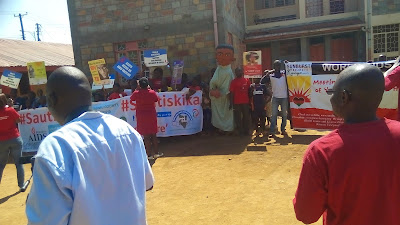







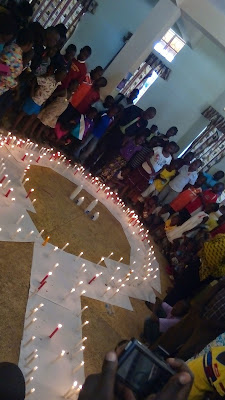










































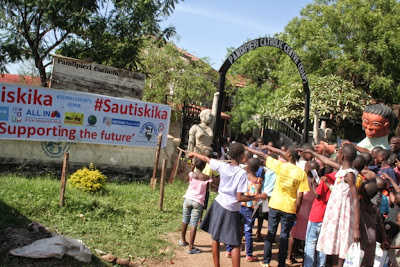





























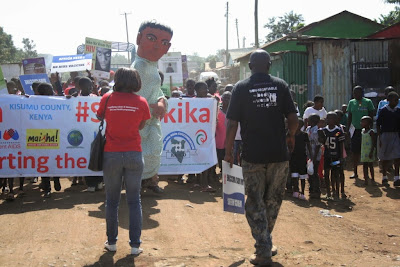




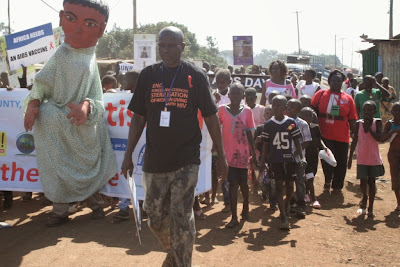





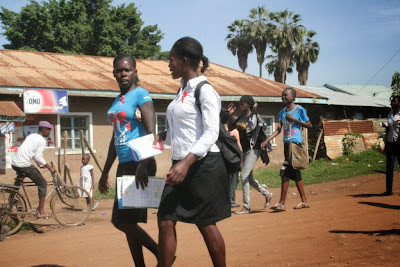
























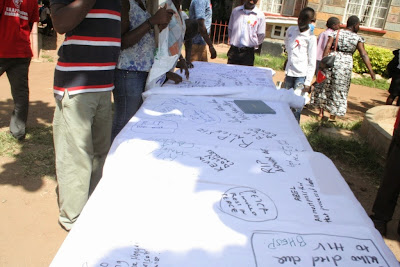





































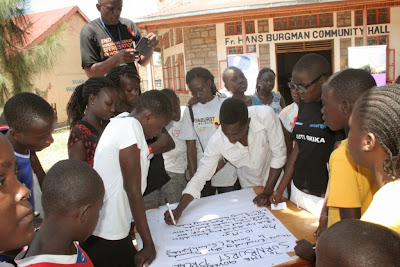






































































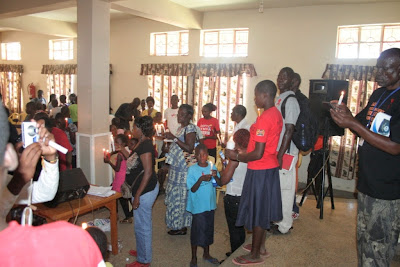




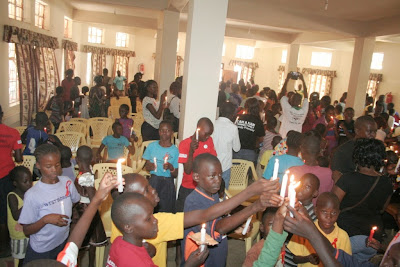













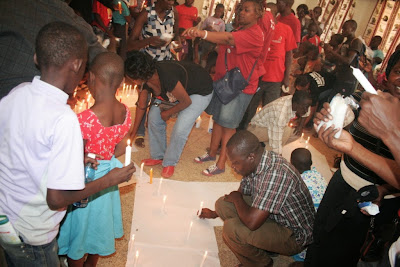















































































































































































































































































































































Subscribe to:
Comments (Atom)












